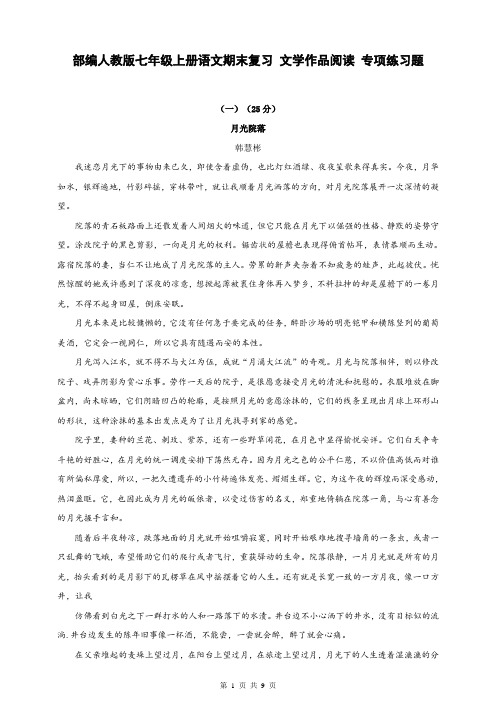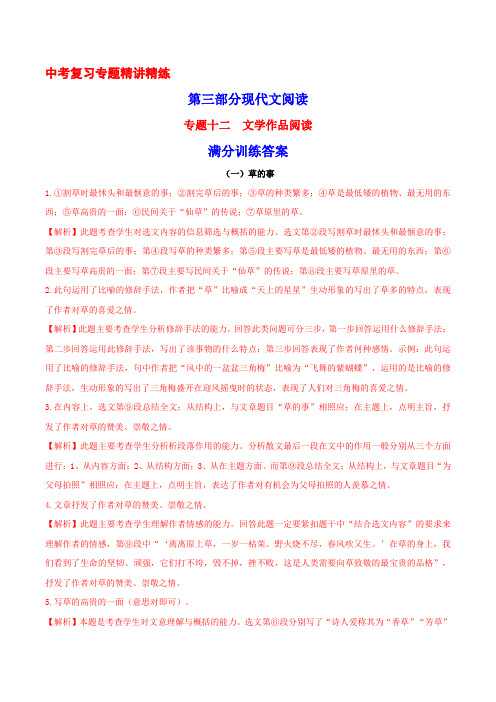文学作品阅读题
部编人教版七年级上册语文期末复习 文学作品阅读 专项练习题(含答案)

部编人教版七年级上册语文期末复习文学作品阅读专项练习题(一)(25分)月光院落韩慧彬我迷恋月光下的事物由来已夂,即使含着虚伪,也比灯红酒绿、夜夜笙歌来得真实。
今夜,月华如水,银辉遍地,竹影碎摇,穿林带叶,就让我顺着月光洒落的方向,对月光院落展开一次深情的凝望。
院落的青石板路面上还散发着人间烟火的味道,但它只能在月光下以倔强的性格、静默的姿势守望。
涂改院子的黑色剪影,一向是月光的权利。
锯齿状的屋檐也表现得俯首帖耳,表情恭顺而生动。
露宿院落的妻,当仁不让地成了月光院落的主人。
劳累的鼾声夹杂着不知疲惫的蛙声,此起彼伏。
恍然惊醒的她或许感到了深夜的凉意,想掀起薄被裹住身体再入梦乡,不料拉抻的却是屋檐下的一卷月光,不得不起身回屋,倒床安眠。
月光本来是比较慵懒的,它没有任何急于要完成的任务,醉卧沙场的明亮铠甲和横陈竖列的葡萄美酒,它定会一视同仁,所以它具有随遇而安的本性。
月光泻入江水,就不得不与大江为伍,成就“月涌大江流”的奇观。
月光与院落相伴,则以修改院子、戏弄阴影为赏心乐事。
劳作一天后的院子,是很愿意接受月光的清洗和抚慰的。
衣服堆放在脚盆内,尚未晾晒,它们阴暗凹凸的轮廓,是按照月光的意愿涂抹的,它们的线条呈现出月球上环形山的形状,这种涂抹的基本出发点是为了让月光找寻到家的感觉。
院子里,妻种的兰花、刺玫、紫苏,还有一些野草闲花,在月色中显得愉悦安详。
它们白天争奇斗艳的好胜心,在月光的统一调度安排下荡然无存。
因为月光之色的公平仁慈,不以价值高低而对谁有所偏私厚爱,所以,一把久遭遗弃的小竹椅遍体发亮、熠熠生辉。
它,为这午夜的辉煌而深受感动,热泪盈眶。
它,也因此成为月光的皈依者,以受过伤害的名义,郑重地倚躺在院落一角,与心有善念的月光握手言和。
随着后半夜转凉,跌落地面的月光就开始咀嚼寂寞,同时开始艰难地搜寻墙角的一条虫,或者一只乱舞的飞蛾,希望借助它们的爬行或者飞行,重获驿动的生命。
院落很静,一片月光就是所有的月光,抬头看到的是月影下的瓦楞草在风中摇摆着它的人生。
初一语文国外文学作品试题答案及解析

初一语文国外文学作品试题答案及解析1.名著阅读(4分)“有个寡妇养着一只母鸡,母鸡每天下一个蛋。
她以为多给鸡喂些大麦,鸡就会每天下两个蛋。
于是,她就每天这样喂,结果母鸡长得越来越肥,每天连一个蛋也不下了。
”以上文字出自(国名)著名的寓言集《》。
这则寓言告诉们一个道理:。
【答案】古希腊(1分)《伊索寓言》 (1分)人不能太贪婪,否则,会连已经拥有的利益也会失去。
(2分)【解析】文学及名著一般考查经典篇目的出处及重要作家的资料和作品有关内容。
解答这类题目关键以课本的注释为主,注意平时的积累。
这里学生应识记《伊索寓言》相关内容。
【考点】识记文学常识。
2.名著检测:(5分)【1】《童年》的作者是______。
这是作者的以自身经历为原型创作的_____体三部曲之一。
【答案】高尔基、自传体【2】《童年》的主人公名叫______。
在污浊环境下,他的身边也有一些好人,多次舍身用自己的胳膊挡住外祖父薯条子的,对主人公心灵产生极大影响的房客是。
【答案】阿廖沙、小茨冈、好事情3.《鲁滨逊漂流记》是一部成功的_________小说,小说主人公鲁滨逊也因此成为欧洲文学史上的一个著名的文学形象。
小说中的描写_______________________________是全书的精华。
这本书的作者就是_______________________。
在鲁滨逊的性格中,哪一点最让你喜欢或敬佩?答:_______________________________________________________________________。
【答案】现实主义鲁滨逊在荒岛上的经历丹尼尔•笛福敢于冒险,或勇于追求自由自在、无拘无束的生活;或顽强、坚毅。
【解析】本题考查名著《鲁滨逊漂流记》阅读,考察了作者、主人公及其性格方面的知识。
对于名著阅读只要认真读,识记作者,理解故事情节,回答问题就不难了。
【考点】默写常见的名句名篇。
4.名著阅读:(4分)(1) “当那个可怜的蝗虫移动到螳螂刚好可以碰到它的地方时,螳螂就毫不客气,一点儿也不留情地立刻动用它的武器,用它那有力的‘掌’重重地击打那个可怜虫,再用那两条锯子用力地把它压紧。
文学作品阅读复习题

文学作品阅读练习(一)阅读下面的文字,完成文后各题。
雨雨,应该是一个阴性名词,她,而不是他。
雨,完完全全是女性化的。
春三月的雨,是少女,正值豆蔻年华。
她文静、温柔、清新、羞涩。
于人不觉间,她轻轻悄悄地走来,“随风潜入夜,润物细无声”。
她如纱如雾,如情似梦,沾衣不湿,拂面不寒。
她的裙袂飘过处,天地万物从沉沉昏睡中苏醒过来,种子发出嫩芽,竹林长出春笋,杨柳抽出新枝,睡了一冬的小生灵也伸伸懒腰,走出深深的地穴。
春雨,把青春和生命赠给大地。
春雨,又是一个爱美的姑娘,一个极擅丹青的画师。
她手执神奇的画笔,挥洒出一个美丽的天地。
“梨花一枝春带雨”,何等脱俗;“杏花春雨江南”,何等淡雅;而“小楼一夜听风雨,深巷明朝卖杏花”,又是怎样的清幽。
这全是春雨的手笔啊。
春雨,遍体芬芳的少女,爱美写美的画师。
夏日的雨,是大嫂,她是个急性子,来也匆匆,去也匆匆,是个利索干净还带着几分泼辣的中年妇女。
比起春雨,夏日急雨少了几分温柔和文静,可你知道,她有那样多的事情要做,她是一位多子女的母亲。
江河湖海等待着她补充营养,以丰腴自己的身躯。
被太阳烤得口干舌燥的大地渴望着她的滋润。
田野上的庄稼禾苗,山坡上的树木果林,像一群群嗷嗷待哺的孩子,急盼着她的乳汁。
年复一年地,她用自己充溢的乳汁喂饱了结实的高粱,喂鼓了肥胖的豆荚,喂足了圆滚滚的西瓜,喂熟了沉甸甸的稻穗。
有了她,才有果实,才有收获,才有万种生物的生生不息。
夏日的雨,能干的大嫂,慷慨的母亲。
秋日的雨,是阅尽沧桑的老妇人。
她见过了许多,经过了许多,也做过了许多。
她曾经年轻过,辉煌过。
如今,桃花梨花谢了,高粱玉米收割了。
她该做的要做的都已做过,便显得有几分落寞。
更有那喜欢悲秋的写出“冷雨敲窗”的诗句,发出“一场秋雨一场凉”的抱怨。
可她是宽容的,豁达的。
她知道,人们不会忘记她的过去,不会忘记她做过的一切。
她并不落寞,她正在描画“红于二月花”的霜叶,绘制出层林尽染、色彩绚丽的秋之图。
更何况,不久之后,又有三月春雨,少女般姗姗而来。
(杭州专版)中考语文专题一 文学类作品阅读 小说天地

4.本文表达的主旨与《秋天的怀念》有什么相似之处?(3 分) 都叙述了史铁生与已故亲人的生活往事,表现了史铁生对亲人 深切的怀念和无尽的爱,以及史铁生对“子欲养而亲不待”的 悔恨惋惜之情。
二、点此链接阅读文章《道歉》
1.请用简洁的语言概括文章的主要内容。(4分)
“我”因迟到及情绪没有完全恢复,在进教室时用力推门, 凯恩老师让“我”给门道歉,并劝导“我”学会包容和爱;“ 我”向祖父道歉,感化了粗鲁的祖父,使整个家更温馨,充满 着爱。
(2)只不过是几十块钱,但是我就是愿意承他的情,接受这 份庞大的,震撼我内心的善意。(如何理解“只不过”几十块钱, “我”却说是“庞大的”善意?)
示例:“只不过”指对于“我”来说钱的数量少,然而,“ 这么贫穷的人,仍然愿意对陌生人心怀着慷慨,愿意给予”这 种贫穷中的高贵异常可贵,所以说这份善意是“庞大的”。
(1)我说4块就4块!你每次都这样!(品析句中加点的词,从 中可以看出大叔是个怎样的人?)
示例:“就”字写出毋庸置疑(或:无可辩驳,不容商量, 下定决心,强调)的语气。“都”暗示这个收费标准向来如此 (或:说明对别人也如此,说明一直是这样)。这两个加点词 可以看出大叔是一个诚实守信(或:说一不二,不贪婪,实在 ,质朴)的人。
3.作者是如何表现矮个子兵去修舵链途中行进的艰难的? 请结合相关内容简要分析。(4分)
①通过“贴”“扒”“抠”“爬”等一系列动作描写,形象 地表现了矮个子兵行进的艰难。②通过描写留在冰上的手套滑 进海里,立刻被海浪吞没这一细节,衬托矮个子兵行进的艰险 。③“差一点儿”“还差一点儿”“就差一点点儿”在反复之 中有变化,突出爬行的艰难和最后一段路程的漫长。
4.母亲一直担心伤害李姨而不愿戴上“我”买给她的金项链,但 小说的结局却写到李姨在母亲入殓时拿出自己一直没戴的金项链 要给母亲陪葬。这样安排有何妙处?请从情节安排、人物塑造这 两个方面进行分析。(4分)
中考语文 专题一 文学作品阅读 第一类 散文阅读 (典例精析 考点特训)

4.本题考查观点的表达能力。此题为开放题,答案不唯一。如果 认为能等来,可抓住文章倒数第三、四段“我”和斑鸠关系的令 人振奋的突破这一情节来表述理由;如果认为不能等来,则可抓 住文中人类伤害鸟兽的各种行为去分析、阐述理由。
点此链接阅读文章(一)《聆听父亲》
1.通读全文,完成下面表格。(4分)【考点一】
不多余。第二段讲述了“我”在波士顿城郊见到人鸟兽共存共荣 的景象,第三段写了我们对鸟兽的伤害,造成了鸟兽对人类的警惕 。这两段文字与前后文关系密切,既回应了“我”重见斑鸠时的惊 喜,又对后文斑鸠难以跟“我”建立信任关系的原因做了交待;使 文章内容丰富而厚重,行文具有变化,避免了平铺直叙。
3.本题考查段落内容的作用分析。阅读文章可知,第二段属于插 叙,是作者对六年前在波士顿人与斑鸠和谐共处画面的回忆;第 三段写的是我们对鸟兽伤害的各种行为。二者形成鲜明的对比, 也正是因为有这个对比,所以才有了我今日见到斑鸠时的惊喜,也 让读者明白现在再次见到斑鸠而它却极不信任“我”的原因所 在。可以说这两段内容既丰富了文章的内容,又让“我”今日重 见斑鸠的欣喜,与它重建友好关系的过程变得顺理成章。
4.如果傅雷有机会读到此文,你认为他会推荐给傅聪吗?请 结合阅读本文和《傅雷家书》的体会进行阐述。(4分)【考点 七】
会。本文讲述作者回忆生活中父亲用多种方法教“我”识 字,之后用对联的方式教导我们和睦邻里、友善仁德,在嘈杂 的环境中保持内心的平静淡泊等做人做事的道理。体现了父 亲对“我”的良苦用心的教导,以及他独特的教育方法,爱子 之情溢于言表。《傅雷家书》是父亲写给儿子的书信,教导儿 子如何做人、如何对待生活。傅雷用自己的亲身经历和生活 经验教导儿子做人谦虚、做事严谨、礼仪得体;获大
时间
对联
初二语文国内文学作品试题

初二语文国内文学作品试题1.名著阅读。
(4分)(1)结合《水浒传》具体情节,说说下面这两段文字表现了鲁达怎样的性格特点?(2分)【甲】鲁达看着李忠道:“你也借些出来与洒家。
”李忠去身边摸出二两银子来。
鲁提辖看了,见少 ,便道:“也是个不爽利的人。
”……鲁达把这二两银子丢还了李忠。
【乙】且说鲁达寻思,恐怕店小二赶去拦截他,且向店里掇条凳子,坐了两个时辰。
约莫金公去得远了,方才起身,迳到状元桥来。
(2)《水浒传》中,武松最后归宿是什么?并说说武松选择这样归宿的原因。
(2分)【答案】(1)(2分)直爽(耿直)细心(2)(2分)结局:在六和寺出家原因:厌恶杀伐,对朝廷不抱幻想,也不愿再追随宋江。
【解析】名著常识关键在平时积累,文学常识正误的判断点是,作者名(字、号)、称谓、生活时代、作品名、体裁、书中人物、主要情节、作品主题及风格、流派等。
第一题抓住文中人物描写的语句,结合所小说其它情节分析人物性格特点。
第二题,回顾小说中有关武松的内容,根据问题分析作答。
【考点】识记文学常识。
2.名著阅读(4分)《水浒传》和《西游记》都是我国长篇①体小说的代表作品。
《水浒传》是一部英雄传奇小说,讲述了一系列英雄故事,如林教头风雪神神庙、武松打虎、②、浔阳楼题反诗等。
《西游记》是一部神魔小说,③是小说中的主要人物,他因④被如来佛镇压在五行山下,后追随唐僧完成了西天取经大业。
【答案】①章回②宋江③孙悟空④大闹天宫,4分。
【解析】这是对文学及名著的知识考查。
要求学生对课后推荐的名著加以识记,尤其是名著里主要的知识点要记牢。
对中国的古典四大名著考点要格外重视。
此处了解《水浒传》和《西游记》的有关常识。
【考点】识记文学常识。
3.结合你对《水浒》的阅读体悟,选出甲、乙、丙所代表的书中人物正确的一项(2分)茅盾曾经对《水浒》中一些人物作过深刻的评价:“对于甲,我们虽可怜其遭遇,却鄙薄其为人;对于乙,我们既寄以满腔的同情,又深惜其认识不够;对于丙,我们却除了赞叹,别无可言。
2020届中考语文文学作品阅读专练 笼子里的花等5篇(含答案)

2020届中考语文文学作品阅读专练笼子里的花等5篇(一)阅读下面的文字,完成1-4题。
(18分)笼子里的花①遇见那只笼子的时候,正是春末,在我们小兴安岭深处,温暖才刚刚开始。
我走在一个小小的山坡上,稀稀疏疏的林木正吐出崭新的叶,满眼是一片片嫩嫩的绿。
那个笼子就在一棵树下不远处,竹制,底部已经散碎,直插入泥土里。
它可能是曾经挂在树上,里面曾经困囿着一只美丽的鸟,然后忽然坠落,鸟儿飞向了高空。
②然后我看到笼子里的地面上,有一棵小小的植株。
纤细柔弱,一阵风来都会摇曳得很剧烈。
似乎有笼子的阻挡,它才不至于倒下。
笼子不寂寞,在失去了一只鸟儿后,又有这样的一株植物自投罗网。
植物没有翅膀,没有腿脚,也许这样的桎梏对它并没有什么限制,反而会是一种保护和陪伴。
③再次去那里的时候,已是半个月后。
这一次,我改变了原来的看法。
此时草木已经繁茂,覆盖了天空也覆盖了大地。
那个笼子几乎淹没于杂草间。
笼子里的那棵植物高大粗壮了许多,顶部的细干和周围的枝丫,纷纷从笼子栅栏的间隙钻出来,或旁逸斜出,或扭曲向上,看起来像是它把笼子缠绕围困起来。
④可是即使如此,我也觉得那个偶然的笼子限制了这株植物的生长,使它不能恣意于风雨之中尽情舒展。
它身畔的那些花花草草,都已经蹿得老高,仿佛争相努力着,去抢从高树间泄落的阳光。
⑤于是我心里便有了一份牵念。
总是在不经意间,想起山坡上笼子里那株不知名的植物。
再见它时,已是十多天后。
夜里一场雨悄悄地路过,把山色濯洗得清亮无比。
踩着一地的微滑与松软,来到那棵树下,一眼看去,竟然没有发现那个笼子。
⑥用目光细细地梳理过去,才在一丛绿色中发现那个笼子。
它比原来高了许多。
那棵植物已经更高大粗壮,而且枝繁叶茂,像许多只臂膀,把笼子拖离了地面。
笼子就像它腰间的一条短裙,被枝枝丫丫托举着,被密密层层的叶子遮掩着,身形完全被植物包裹住。
枝丫间结了许多细小的花蕾,向着四面八方,自由而奔放。
在风行雨过中,植物越发茁壮,而笼子却越发破败了。
中考语文二轮专题复习精讲精练(全国通用)专题十二 文学作品阅读(答案及解析)

中考复习专题精讲精练第三部分现代文阅读专题十二文学作品阅读满分训练答案(一)草的事1.①割草时最怵头和最惬意的事;②割完草后的事;③草的种类繁多;④草是最低矮的植物、最无用的东西;⑤草高贵的一面;⑥民间关于“仙草”的传说;⑦草原里的草。
【解析】此题考查学生对选文内容的信息筛选与概括的能力。
选文第②段写割草时最怵头和最惬意的事;第③段写割完草后的事;第④段写草的种类繁多;第⑤段主要写草是最低矮的植物、最无用的东西;第⑥段主要写草高贵的一面;第⑦段主要写民间关于“仙草”的传说;第⑧段主要写草原里的草。
2.此句运用了比喻的修辞手法,作者把“草”比喻成“天上的星星”生动形象的写出了草多的特点,表现了作者对草的喜爱之情。
【解析】此题主要考查学生分析修辞手法的能力。
回答此类问题可分三步,第一步回答运用什么修辞手法;第二步回答运用此修辞手法,写出了该事物的什么特点;第三步回答表现了作者何种感情。
示例:此句运用了比喻的修辞手法,句中作者把“风中的一盆盆三角梅”比喻为“飞舞的紫蝴蝶”,运用的是比喻的修辞手法,生动形象的写出了三角梅盛开在迎风摇曳时的状态,表现了人们对三角梅的喜爱之情。
3.在内容上,选文第⑨段总结全文;从结构上,与文章题目“草的事”相照应;在主题上,点明主旨,抒发了作者对草的赞美、崇敬之情。
【解析】此题主要考查学生分析析段落作用的能力。
分析散文最后一段在文中的作用一般分别从三个方面进行:1、从内容方面;2、从结构方面;3、从在主题方面。
而第⑨段总结全文;从结构上,与文章题目“为父母拍照”相照应;在主题上,点明主旨,表达了作者对有机会为父母拍照的人羡慕之情。
4.文章抒发了作者对草的赞美、崇敬之情。
【解析】此题主要考查学生理解作者情感的能力。
回答此题一定要紧扣题干中“结合选文内容”的要求来理解作者的情感,第⑨段中“‘离离原上草,一岁一枯荣。
野火烧不尽,春风吹又生。
’在草的身上,我们看到了生命的坚韧、顽强,它们打不垮,毁不掉,挫不败,这是人类需要向草致敬的最宝贵的品格”,抒发了作者对草的赞美、崇敬之情。
- 1、下载文档前请自行甄别文档内容的完整性,平台不提供额外的编辑、内容补充、找答案等附加服务。
- 2、"仅部分预览"的文档,不可在线预览部分如存在完整性等问题,可反馈申请退款(可完整预览的文档不适用该条件!)。
- 3、如文档侵犯您的权益,请联系客服反馈,我们会尽快为您处理(人工客服工作时间:9:00-18:30)。
文学作品类阅读理解(1)1“Do you feel any better, Henry?” Rinaldi seated himself in the chair next to the bed. “You know what‟s happening? They are planning to give you a medal.”“No way! What did I do?”“But you have been seriously injured. You at least will get a bronze one. And if you did something special, they will give you a silver one. Did you do anything special?”“No, nothing!”“Weren‟t you carrying anybody while you were wounded?”“Of course not.”“Well, I heard you insisted on letting other patients get treated before you.”“I didn‟t insist very strongly.”“Tha t‟s alright. I don‟t think it‟s a problem. I‟m pretty sure that you can get a silver one! We are all full of pride when we think about you.”“So, how did the battle go?”“Didn‟t you read the newsletter? We took that little town and got almost a thousand enemies to give up!”“How are you doing?”“I‟m doing very well! I‟m becoming a better doctor every day. But enough about me…do you still hurt? How are the wounds? How‟s your head doing? The doctor‟s chart says that your head is all right. You were really unlucky to have that major work on you! He‟s not a good doctor. He is more like a meat cutter. It must drive you mad to stay in this bed all day long! Please get out of here as soon as possible.I miss you. The room is so empty now that there‟s nobody sharing it with me.”“What about Miss Barkely?”“Of course, I will go and get her. But you rest for a while. And here, I brought you some alcohol to take away some of the pain. By the way, I think the priest(牧师) wants to come see you. You know, sometimes I wonder if you two aren‟t lovers,”he said laughing.“Shut up, you stupid Italian!”“I have to go now. Get well soon! I have no one to joke with.”40. What‟s the relationship between Henry and Rinaldi?A. Official and solider.B. Roommates.C. Lovers.D. Doctor and patient.41. The underlined word “work” in the passage refers to ______.A. the cutB. being a soliderC. the woundD. the medal42. We can know from the passage that ________.A. Rinaldi didn‟t know Henry very well.B. the priest and Miss Barkely are lovers.C. Henry was very badly wounded in the head.D. Henry probably got wounded in the battle.43. Which of the following is TRUE according to the passage?A. Rinaldi is a pleasant guy.B. A silver medal was awarded to Henry.C. Henry got a thousand enemies to give up.D. Rinaldi was more like a meat cutter than a doctor.2Ben walked quietly. He wanted to surprise the hunter. But then, what would he do? Suddenly he heard a bird‟s wings beating the dry grass. Ben moved quickly toward the sound.He saw a colored head ... the head of a beautiful bird. The bird did not move until Ben came close. Then it tried to fly away, but one wing was broken.Ben lifted the bird and held it close against his body. The bird fought to escape, but soon lay quietly in Ben‟s arms.Ben decided to take the bird home and fix its broken wings so that it could fly again. He was almost out of the woods when he heard the hunter behind him.“You just found that bird?” the hunter asked.“Yes,” Ben answered.“It is mine!”Ben was afraid and tried to answer, but his mouth was too dry to speak. Nevertheless, he wetted his lips and said, “No.”“I shot him and I say he is mine!”“But he is not dead yet,” Ben answered, “and besides, anything on my land belongs to me.”The hunter looked down at the little man and smiled. “Say, who are you?”Ben‟s voice shook with both fear and anger. “I own this land. There are sign s everywhere that say, …No hunting‟.”“No need to get angry, mister,” the hunter said. “Control yourself.”There was something threatening in the man‟s cool quiet voice. And he had a gun. His arms were free and Ben‟s were not.The hunter stepped closer and said, “Give me that bird!”Ben was white with anger. “No!” he answered. His eye glasses became wet and he had to look over the top of them to see the other man.“Give me the bird and I will go away,” the hunter said.“You get off my land,” Ben told him. “Get off right now...you do not belong here!”The man‟s face got red. “Mister,” he said, “I have been hunting here all my life.I grew up here.”“That is a thing of the past,” Ben said. “I do not know who you are and I do not care. I own this place now and I am telling you to leave. You go back through the woods and get off my land!”“Now look, mister,” the hunter said, “be reasonable.”The hunter raised his gun.A cold wind blew across Ben‟s face. He looked into the hunter‟s gray eyes. Ben was frightened. It was not too late, he thought. He could still give the bird to the hunter and return safely home...that would end this whole ugly business.The bird struggled weakly and made a wild, strange noise.Then Ben knew he could never give this bird to the hunter. This feeling gave Ben great strength, and he was no longer afraid.“I will never let you kill this bird,” he said. “Get away from here. If you try to take this bird, I will fight...you have a gun and you are bigger, but that does not worry me. You will n ever get this bird...you will have to kill me first.”The two men looked at each other. Ben‟s fear returned. His knees began to shake and he felt sick. Yet he stood straight, wondering what would happen next. They stood close to each other for a long time. The woods were strangely quiet. Then the hunter‟s rough voice broke the silence.“You are a fool.” And then to Ben‟s surprise, he slowly walked away.Ben watched until he was gone. His arms hurt, his body felt wet and cold.67. Why did the hunter smile w hen saying “Say, who are you”?A. He wanted to confirm Ben‟s identity in a friendly way.B. He was amused at Ben‟s reply and interested in him.C. He looked down on Ben and thought his reply ridiculous.D. He meant to be friendly enough to get the bird from Ben.68. What strengthened Ben‟s determination never to give the bird to the hunter?A. His strong dislike of the hunter.B. His firm confidence in himself.C. His ownership of this piece of land.D. His concern and sympathy for the bird.69. Why did the hunter remark that Ben was a fool at the end of the story?A. Ben tried to protect a bird at all costs.B. Ben pretended to be fearless although scared.C. Ben stood close to him saying nothing for long.D. Ben insisted on him leaving the land.70. Which of the following best describes Ben‟s state of mind in the incident?A. Ben was willing to compromise.B. Ben never thought of giving in.C. Ben held out to the end.D. Ben was sure about his victory.答案:67-70 CDAC3(Mr Jones, the owner of a farm, was one day driven out of the farm by all the animals he raised. The animals were excited to be free and independent. More important, they were masters of their own and, of course, their farm. Animals made seven rules of their own and Snowball painted them on the wall.)THE SEVEN COMMANDMENTS1. Whatever goes upon two legs is an enemy.2. Whatever goes upon four legs, or has wings, is a freind.3. No animal shall wear clothes.4. No animal shall sleep in a bed.5. No animal shall drink alcohol.6. No animal shall kill any other animal.7. All animals are equal.It was very neatly written, and except that “friend” was written “freind” and one of the “S‟s” was the wrong way round, the spelling was correct all the way through. Snowball read it aloud for the benefit of the others. All the animals nodded in complete agreement, and the cleverer ones at once began to learn the Commandments by heart.“Now, comrades,” cried Snowball, throwing down the paintbrush, “to the hayfield! Let us make it a point of honor to get in the harvest more quickly than Jones and his men could do.”But at this moment the three cows, who had seemed uneasy for some time past, let out a loud lowing. They had not been milked for twenty-four hours, and theirudders were almost bursting. After a little thought, the pigs sent for buckets and milked the cows fairly successfully, their trotters (蹄子) being well adapted to this task. Soon there were five buckets of frothing creamy milk at which many of the animals looked with considerable interest.“What is going to happen to all that milk?” said someone.“Jones used sometimes to mix some of it in our food,” said one of the hens.“Never mind the milk, comrades!” cried Napoleon, placing himself in front of the buckets. “That will be attended to. The harvest is more important. Comrade Snowball will lead the way. I shall follow in a few minutes. Forward, comrades! The hay is waiting.”So the animals trooped down to the hayfield to begin the harvest, and when they came back in the evening it was noticed that the milk had disappeared.67. Who is the leader of the animals?A. Snowball.B. Jones.C. Napoleon.D. Cows.68. When does the story take place?A. In spring.B. In summer.C. In fall.D. In winter.69. What can we infer from the story?A. The animals are having a revolution.B. The animals are doing a play.C. The animals don‟t think they are equal.D. The animals will live a harmonious life.70. Who is indicated as the animals‟ enemy?A. The chicken.B. The human being.C. The cow.D. The pig. KEYS: 67-70 CCAB4In this voyage I visited my new colony on the island, saw the Spaniards(西班牙人), had the whole story of their lives and of the villains(罪犯) I left there; how at first they treated the poor Spaniards badly,·how they afterwards agreed, disagreed, unired, separated, and how at last the Spaniards were forced to use violence with them; how they gave in to the spaniards, how honestly the Spaniards used them ---- a history, if it were entered into, as full of variety and wonderful accidents as my own part ---- particularly, also, as to their battles with the Caribbeans, who landed several times upon the Island, and as to the improvement they made upon the Island itself, and how five of them made an attempt upon the main land, and brought away eleven men and five women prisoners, by which, at my coming, I found about twenty young children on the Island.Here I stayed bout 20 days, left them supplies of all necessary things, and particularly of arms, powder, shot, cloths, tools, and two workmen, which I brought from England with me, namely a carpenter and a smith.Besides this, I shared the Island into parts with them, reserved to myself the property of whole but gave them such parts respectively as they agreed on; andhaving settled all things with them and encouraged them not to leave the place, I left them there.From then on I landed the Brazils, from where I sent a bark, which I bought there, with more people to the island; and in it, besides other supplies, I sent seven women, being such persons as I found proper for service, or for wives to such as would take them. As to the Englishmen, I promised them to send them some women from England, with a good cargo(船货) of necessaries, if they would apply themselves to planting ---- which I afterwards could not perform. And the fellows proved very honest and diligent after they were mastered and had their properties set apart for them. I sent them also from the Brazils five cows, three of them being big with calf, some sheep, and some pigs, which when I came again were considerably increased.But all these things, with an account how 300 Caribbeans came and invaded(入侵) them, and ruined their plantations, and how they fought with that whole number twice, and were at first defeated, and one of them killed; but at last a storm destroying most of their enemies‟ boats, they destroyed almost all the rest, and renewed and recovered the possession of their plantation, and still lived upon the Island.All these things, with some very surprising incidents in some new adventures of my own, for ten years more, I may perhaps give a further account of the story.66. From Paragraph l, we know _______ .A. the Spaniards were always getting along well with the villainsB. the Spaniards were always the rulers of the islandC. the Spaniards and the villains both ruled the island peacefullyD. the Spaniards and the villains once had battles witll each other67. In Paragraph 2, the place where I stayed was probably ________.A. a wild islandB. a deserted downtownC. a primitive supermarketD. a new city68. The underlined word “respectively” in the third paragraph probably means ______ .A. separatelyB. particularlyC. speciallyD. surprisingly69. The writer of the story once went to _______.A. Japan and BrazilB. England and BrazilC. France and SpainD. Korea and Caribbean70. From the story, we can judge the Writer might be _______ .A. an invaderB. a carpenterC. an adventurerD. a prisoner Keys: DAABC。
